Tag: perspective
Your experiences are valid
I recently had a pain in my body so strong that it kept me awake for four nights. I didn’t know what was causing it. When I saw my doctor, she didn’t seem to know what the problem was or think it was a serious issue. For a moment, I started to question if the sleeplessness and severity of the pain was really a big deal. As the appointment was wrapping up, she mentioned that I could get a test before I left.
When the test results came in, it showed a definitive cause of the pain. The treatment was just a strong dose of Ibuprofen and the issue eventually resolved itself. I was elated. I felt relieved to know what the problem was and that there was a simple treatment. But much more than that, I felt vindicated. The test results were undisputable, and proved to the doctor that I wasn’t exaggerating or having a psychosomatic issue, imagining my discomfort.
The reason for this story that is both too vague and too personal is that there was pain. Whether or not the test uncovered the reason for the pain, there was pain. I was awake for four nights and there was no reason for me to try to convince myself that that experience was any different from what it was. And yet when my physician didn’t seem concerned, I started to question it.
It is not uncommon for other people to dismiss our pain because it isn’t theirs. It doesn’t mean the pain isn’t there. The analogy to work is that when people are inside toxic workplaces, it is very easy for their concerns to be brushed aside.
If your coworkers, friends, or family downplay your descriptions of harassment, verbal abuse, retaliation or other serious work issues, take a step back to consider their motivations. When people respond unempathetically, it might be because they don’t know how to process your suffering and therefore try to squash the topic that is making them uncomfortable. Another possibility is that their egos are trying to protect them from imagining what it would be like to be in your position. They may have a belief that they are too smart or too strong to “let” themselves be abused, and use that belief like a magic charm to ward against it. A third possibility is that they are resigned to the fact that workplaces are frequently toxic and there aren’t great options for dealing with it.
Regardless of the reasons why others may respond poorly, you don’t need external validation for your lived experiences to be true. Trust yourself. Your experiences are valid.
Playing to our strengths

Yesterday a nonprofit that I volunteer with hosted their annual fundraising gala. I enjoy participating but I also feel a lot of stress around this event.
One issue is feeling bad for not procuring enough items for the silent auction. I didn’t procure any this year, agghh! Another is struggling to invite people to attend because I feel awkward asking. Fellow introverts: tell me you can relate!
Part of my guilt is that the agency asks board members to do these things and I hate failing to meet an expectation. This was bothering so much that I had to find a way to resolve it.
I decided to remind myself that I contribute in other ways by volunteering on a committee and spending time on other projects and programs every month. But I needed to reinforce this idea so that I fully believed it. There was still a part of me that thought “Yes you do those things, but you should also do more for the fundraiser.”
So, I shared how I was feeling with another volunteer while we were setting up the room in the morning. He said that he also has a hard time asking people for donations and that events aren’t his strong point. Then we spent a few minutes talking about a few volunteers who are very good at it: they have great event planning skills and enthusiastically seek out services and items for the auction. We are grateful for them and know how much the agency needs people like them.
But as we continued to talk, we agreed that the agency needs volunteers that offer varying strengths. We need people who are great at fundraising and events and we also need people who are good at policy, project management, public speaking, and skills that are core to the agency’s mission. We can’t all be good at everything, but we need everyone’s individual strengths to cover the components that are critical to the agency.
I’m sure I’ll continue to be nervous about helping with the gala. But I’m finally at peace with my contributions. Staying focused on my strengths is more helpful than using my available time and energy trying to be less bad at fundraising.
The same is true in our careers. Not everyone is good at talking to clients or tracking budgets or documenting processes. Making the most of our strongest abilities will have a bigger impact than being devoted to turning a weak skill into a mediocre skill.
5 Second Rule

The other day I was eating cake at my desk when I accidentally knocked the pan off the table. It landed frosting-side down on the carpet.
My first reaction was to panic in case the frosting had become smooshed into the carpet strands (it hadn’t). Then I laughed, calmly picked up crumb after crumb with my fingertips and got back to work.
I was glad I didn’t get frustrated about the mess and the time it took to clean up. I think my relief at not having to deep-clean a quarter inch of chocolate goop out of carpet fiber helped me relax and find the humor in it. But I also remember a flicker of a moment when I decided to think it was funny instead of a setback to my schedule.
Maybe the next time I have a setback with work, I’ll use that blink of time to lighten up, or steel myself, or to decide to shrug and let it go. Kind of like I did with the cake crumbs.
Losing Perspective and Getting it Back
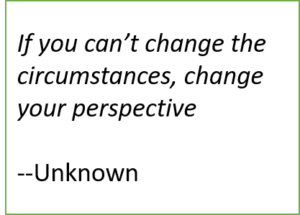 When we’re in the middle of challenging circumstances at work, it is easy to lose perspective.
When we’re in the middle of challenging circumstances at work, it is easy to lose perspective.
Under significant stress, we get tunnel vision. When our adrenal glands activate our flight or fight response, we narrow our focus to better deal with the threat at hand.
That’s great when we’re faced with immediate bodily harm. It’s not helpful when our bodies feel threatened every time we go to work.
When our attention is tightly focused on the stressful problem we’re experiencing, our ability to come up with solutions is reduced. Our brains draw on what we’ve already learned and experienced.
For example, maybe every time your previous manager yelled at you about a project you could calm them down by saying “Yes, I’ll get right to it”. Now your brain might be stuck on finding similar solutions, even if that approach doesn’t work at all with your current boss.
When you’re on high alert at work from constant stress, your natural flight or fight response is probably not going to help you deal with your manager, either. When they berate and demean you in front of your colleagues, you might feel an urge to throw a punch or to run out of the building. If you’re in control of your behavior, you’re most likely to freeze instead.
Many of us have felt stuck in a bad job. When we’re in a toxic workplace for a long time, our narrowed perspective can seem like our only reality. It might seem like there aren’t any good solutions. For every idea, we think of reasons why it won’t work. At times like this our best moments are when we’re distracted from thinking about our jobs.
How do we get perspective back once it’s lost?
The best advice I’ve learned is from the book Good to Great, by Jim Collins. In chapter four, Collins interviewed retired Vice Admiral Jim Stockdale, who survived nearly eight years as a prisoner of war in Vietnam. As he described his survival, Stockdale said, “You must never confuse faith that you will prevail in the end—which you can never afford to lose—with the discipline to confront the most brutal facts of your current reality, whatever they might be.”
Stockdale had an unwavering belief that he would get out of captivity without ignoring the horrific situation he was in. He not only survived, but went on to complete his military career, work in academia, and write a book.
Having faith that you will prevail over your current work circumstances can be challenging when you feel like you’re in survival mode. But think of Stockdale. He was literally in survival mode and prevailed.
Can you believe that you will go on to a better job and leave your miserable one behind? I have talked to over a hundred people who have done this. They were call center employees, pizza deliverers, paralegals, tech workers, correction officers, teachers, government employees, among others.
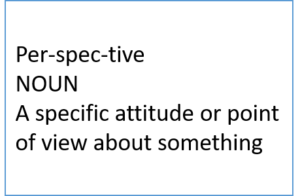 In my own career, I once felt trapped in a stressful job where I felt miserable most of the time. I believed that I could quit and find a different job, but I kept thinking of reasons not to. I worried that a new job would have worse benefits, or that I’d have a long commute, or that maybe the good parts of my job should outweigh the bad. I worried about the unknown.
In my own career, I once felt trapped in a stressful job where I felt miserable most of the time. I believed that I could quit and find a different job, but I kept thinking of reasons not to. I worried that a new job would have worse benefits, or that I’d have a long commute, or that maybe the good parts of my job should outweigh the bad. I worried about the unknown.
I had to convince myself to accept “the brutal facts of my current reality”. This meant accepting that there were positive parts of my job that I would miss: a project that I loved working on, many coworkers, and the salary and benefits. I also accepted that the job was wrong for me and I needed to leave it.
It took a long time for me to reach that point, but once I did, my perspective changed in an instant. At the time, I was home sick and didn’t have the energy to do much other than rest. I remember reclining on my couch, staring at the walls of my home, my sanctuary. I suddenly realized that a big reason why I stayed in my job was that it paid the mortgage and other bills.
In that moment, the trap was broken. I knew I could find other work that paid my living expenses, and that staying at my job wasn’t worth the negative impact it had on my wellbeing.
From that moment on, ideas for work came to me without trying. My mind opened to new options, I started writing again, and stopped worrying about paying the mortgage. I was confident in the many positive possibilities that my future could hold.
That was many years and mortgage payments ago. Since then I have been on a whirlwind of adventures in business and writing that I could not have imagined when I was clawing at solutions from inside a small, weary point of view.
It’s OK to be Angry at Injustice
 There was a time when I thought that anger was a bad emotion. We’re told to “cultivate peace in our hearts,” that “anger will eat you up inside,” and “to let it go.” Now I know it’s not that simple.
There was a time when I thought that anger was a bad emotion. We’re told to “cultivate peace in our hearts,” that “anger will eat you up inside,” and “to let it go.” Now I know it’s not that simple.
One of my favorite people that I’ve worked with gave me a new perspective about anger. We were talking about how a person with authority in our office treated people disrespectfully and mismanaged programs. This wasn’t a case of a little rudeness here and there; this was systematic bad management.
After venting to my coworker, I said something like “I should try to not get angry about this.” He stopped me and said, “There’s nothing wrong with righteous anger.”
I hadn’t thought of it that way before and it changed the way I viewed my feelings about the situation. I was reacting to injustice. Being aware of the problem and angry about it was better than pretending it wasn’t happening and that I should feel ok about it.
Anger has energy. If righteous anger fuels us to stand up to injustice, then it’s not a bad emotion. It’s a signal that our values are being violated and an energy to work towards change.
Dealing with career disappointment
It is disappointing when you are not where you want to be in your career.
Maybe you thought by the time you were this age that you would be managing a department or earning a milestone salary.
Maybe you hop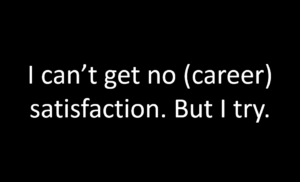 ed that after working this many years in your organization, that you would have been promoted by now.
ed that after working this many years in your organization, that you would have been promoted by now.
Maybe you expected that after the education and training you spent time and money on that you would enjoy your profession – but you don’t.
Or you’ve bounced from job to job and still don’t know what kind of job would make you happy.
I’ve met so many people that are frustrated with their careers for these reasons. The ones that are currently experiencing it often tell me that they feel defeated. They aren’t hopeful that they will ever find career satisfaction. It can be hard to believe it when you’re in the murky depths of a job disappointment, but I can tell you with certainty that is that there is still time for you.
You could still achieve the specific career goal that you have right now. There could be one small shift in your organization – a new manager or a new set of responsibilities that changes everything.
One man that I met about 10 years ago could not seem to get a break in his workplace. Let’s call him John. Year after year, John got not-so-great performance reviews and it seemed like he wasn’t going to move up the career ladder at his company – his career was stalled. Then out of the blue, John’s manager left the company and his new manager took an interest in him. He gave him recognition for his work that he hadn’t had before and praised him to other managers. That year, he finally got promoted and apparently continued to do well – very well: I ran into John last year and learned that he still works for the same company and is now an executive.
The small shift could come from something as simple as on-the-job training that you’re required to do.
A woman that I know, “Abby”, was content in her marketing job at a medium-sized company. Then her manager sent her to a training seminar to learn process improvement that would help the department run more effectively. Abby returned from the training lit up with passion for the techniques she learned.
I remember how excited she was when she talked about it. Her perspective of work went from “this job is ok” to “I know what I want to do with my life.” She kept finding ways to apply her new knowledge. At first, this was within the company she worked for. Then Abby sought out more training on her own, met people in the process improvement field, and through those connections got a full time job doing work that she loved.
If you haven’t found a meaningful job yet, you still can. In my research about people quitting jobs, I heard from dozens of people who were frustrated and exhausted with their work, yet found their way into career satisfaction. I spoke with people in their twenties and people in their late sixties – and all the decades in between. It’s not too late!
Many of the people I talked to could not have imagined their careers they have today back when they felt stuck and unhappy. There were no overnight changes. Instead, they followed their interests one step at a time and discovered opportunities along the way.
If you don’t know where to start, the most useful advice that I learned was to just learn more about whatever topic it is that you’re interested in and see where that leads. This might mean going to a seminar on whatever topic you are curious about. Or looking up information about it on the web or reading a book. Or volunteering for a cause that you care about. I’ve met full-time, paid care-givers at three different animal sanctuaries who started as casual volunteers. They are some of the happiest job-changers that I know.
Just take one step in the direction that interests you. It might lead you down the hallway of your current organization into a slightly different role, or into the dream job you never knew you wanted.
Your Performance Review Isn’t Fair
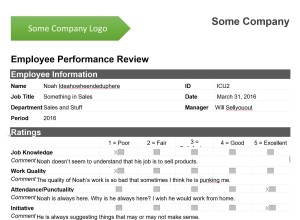 Your performance review is not about how well you served your customers, increased profits, reduced costs, expanded the business, or improved employee morale.
Your performance review is not about how well you served your customers, increased profits, reduced costs, expanded the business, or improved employee morale.
Your performance review is not fair whether it is positive or negative, whether you want to believe it is 100% true or 100% false, and whether you like or loathe your manager.
Your performance review reflects how well you served the department’s objectives.
Perhaps the objectives are clearly defined and understood. Book X amount of sales in new business; Y amount in renewals. Seems non-subjective. What’s the problem?
So many.
So many problems.
For example:
1) Employee A exceeds the sales goals. She should get an excellent review, no? But she doesn’t, because the review process allows for subjective feedback in addition to the objective numbers, and her manager writes in her review that she is not a team player, has low long-term prospects to grow in the company, and lacks initiative.
2) Employee B does not meet the sales goals. He should get a below average review, yes? No, he gets a glowing review. His manager notes in his review that there were unusual circumstances that prevented him from achieving the goals. The economy slowed sales. And, this employee is a positive contributor to the team and deserves an above average review.
3) Employee C does not meet the sales goals. He notes in his self-evaluation that his top customer was restructuring and unexpectedly froze large purchases for the current year. However, he proposed a set of products that would help the customer save significant costs through efficiency, and the customer committed to a purchase that would set a new record in next quota period, plus sustain sales for years to come. So this employee missed his current year goals in order to do the right thing for the customer and for his employer in future years. He should get a great review for doing the right thing for the business, right? No. His manager gave him a poor performance review for not meeting current goals.
These employees are just as likely to report to the same manager as they are to three different managers in the same department, or different managers in different parts of the company.
Disconnect your self-image and self-worth from what your manager writes on your performance review. That document might matter in terms of the bonus or raise you get, or whether you get promoted or are being pushed to leave the organization. However, it isn’t fair, so don’t let it mean more to you than what it is: a tool in the game you signed up for when you accepted this job.
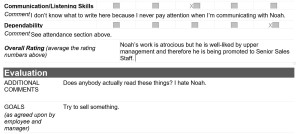
Remembering What Was Good About A Bad Job
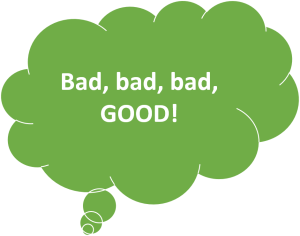 Last weekend I spent time with a friend that I met when I was at a not-so-favorite job. Let’s just say that particular job had many challenges. And not the exhilarating kind that lead to career success and personal fulfillment.
Last weekend I spent time with a friend that I met when I was at a not-so-favorite job. Let’s just say that particular job had many challenges. And not the exhilarating kind that lead to career success and personal fulfillment.
I hadn’t seen this friend in a long time and it popped into my head that her friendship was one of the best things I got from that job. We had a lot of fun while we helped each other cope.
That made me want to remember the other positive outcomes that came from a difficult work experience. Here are a few:
- I am passionate about the projects I managed and am proud of what I accomplished.
- I got to explore two specific types of marketing that I was less familiar with. I built solid skills in those areas that gave me the necessary qualifications for future work.
- I formed friendships and trusted relationships with colleagues that are still important to me.
These benefits are obvious to me, and I acknowledge them when they impact me. When I thought about it more I realized there are less obvious and more personal benefits:
- I learned what my boundaries are and sharpened the line between what I am and am not willing to do to succeed in business.
- I finally accepted that business isn’t always fair. Accepting this killed some of my idealism. However, it affirmed the type of businessperson I am and made it easier to detach from the fairness of an outcome that is not in my control.
- I changed my definition of success. Climbing the corporate ladder is only one way of evaluating success. There are many different ways to be successful in business – not to mention in life.
It takes time to recover after leaving a negative job, just as it does when leaving any significant relationship that was painful. If you’re recently out of a tough work situation I hope that you allow yourself to be angry about what wasn’t right and grieve for the hopes you had for that role.
Eventually, I hope you will also remember what you gained.


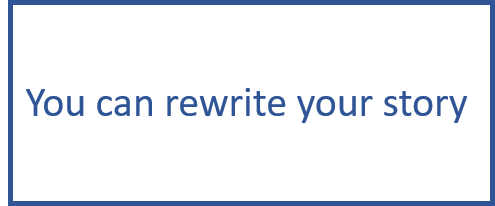
Recent Comments